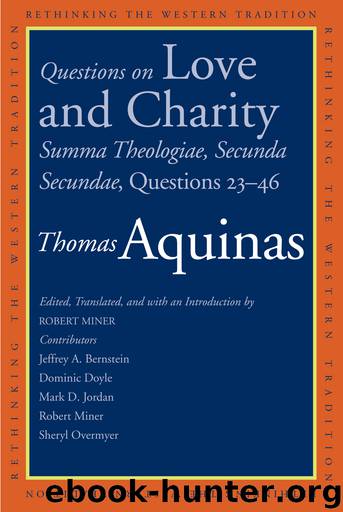Questions on Love and Charity by Thomas Aquinas

Author:Thomas Aquinas [Aquinas, Thomas]
Language: eng
Format: epub
Publisher: Yale University Press
Published: 2016-08-06T16:00:00+00:00
QUESTION 38
[On Contention]
One should next consider contention. About this, two queries are raised. (1) Whether contention is a mortal sin. (2) Whether it is the daughter of vainglory.
Article 1. [Whether contention is a mortal sin.]
One proceeds in this way to the first query. IT SEEMS that contention is not a mortal sin.
[1] Mortal sin is not found in spiritual men. Yet contention is found in them, according to Luke 22: “Contention was generated among the disciples of Jesus, as to which of them would be greater.”1 Therefore contention is not a mortal sin.
[2] Furthermore, mortal sin in our neighbor should not be pleasing to anyone of good disposition. But the Apostle says, Philippians 1, “Some make Christ known out of contention” and adds, “In this also I rejoice, and shall rejoice.”2 Therefore contention is not a mortal sin.
[3] Furthermore, it happens that some contend either in court or in disputation, not with any spirit of maligning, but rather intending the good–just as those do who contend in disputing with heretics. So on 1 Kings 14, “It came to pass one day,”3 the Gloss says: “Catholics do not agitate for contentions against heretics, unless they are first summoned to the dispute.”4 Therefore contention is not a mortal sin.
[4] Furthermore, Job seems to have contended with God, according to Job 39: “Can it be that he who contends with God is so easily silenced?”5 Yet Job did not sin mortally, since about this matter the Lord said, “You have not spoken rightly before me, as my servant Job has,” as attested by the last chapter of Job.6 Therefore contention is not always a mortal sin.
BUT TO THE CONTRARY there is what is opposed by the precept of the Apostle, who says, 2 Timothy 2: “Do not contend by words.”7 And in Galatians 5, contention is numbered among the works of the flesh: “Those who do such things shall not inherit the kingdom of God,” as is said in the same place.8 But everything that excludes one from the kingdom of God and that is opposed by a precept is a mortal sin. Therefore contention is a mortal sin.
I ANSWER THAT IT SHOULD BE SAID that to contend is to tend against someone. So just as discord denotes a certain opposition (contrarietas) in the will, so contention denotes a certain opposition in speech. And because of this, when a person’s speech pours itself out by means of contrary things, this is called “contention,” which is set down as one of the shades of rhetoric by Cicero, who says: “Contention is caused when a speech is made out of contrary things, in this way: ‘He who receives flattery–that is, adulation from a pleasing source–brings about by the same thing the most bitter end.’”9
Now opposition in speech can be observed in two ways. In one way, regarding the intention (intentio) of the person contending; in another way, regarding the manner (modus) of contention. In the intention, one should consider whether someone is opposing truth, which is blameworthy, or whether he is opposing falsehood, which is praiseworthy.
Download
This site does not store any files on its server. We only index and link to content provided by other sites. Please contact the content providers to delete copyright contents if any and email us, we'll remove relevant links or contents immediately.
The remains of the day by Kazuo Ishiguro(7601)
Tools of Titans by Timothy Ferriss(7003)
The Black Swan by Nassim Nicholas Taleb(6237)
Giovanni's Room by James Baldwin(5938)
Inner Engineering: A Yogi's Guide to Joy by Sadhguru(5931)
The Way of Zen by Alan W. Watts(5830)
The Six Wives Of Henry VIII (WOMEN IN HISTORY) by Fraser Antonia(4815)
The Power of Now: A Guide to Spiritual Enlightenment by Eckhart Tolle(4795)
Astrophysics for People in a Hurry by Neil DeGrasse Tyson(4641)
Asking the Right Questions: A Guide to Critical Thinking by M. Neil Browne & Stuart M. Keeley(4627)
12 Rules for Life by Jordan B. Peterson(3781)
The Ethical Slut by Janet W. Hardy(3534)
Skin in the Game by Nassim Nicholas Taleb(3503)
Housekeeping by Marilynne Robinson(3443)
The Art of Happiness by The Dalai Lama(3409)
Double Down (Diary of a Wimpy Kid Book 11) by Jeff Kinney(3302)
Skin in the Game: Hidden Asymmetries in Daily Life by Nassim Nicholas Taleb(3290)
Walking by Henry David Thoreau(3250)
12 Rules for Life: An Antidote to Chaos by Jordan B. Peterson(3215)
